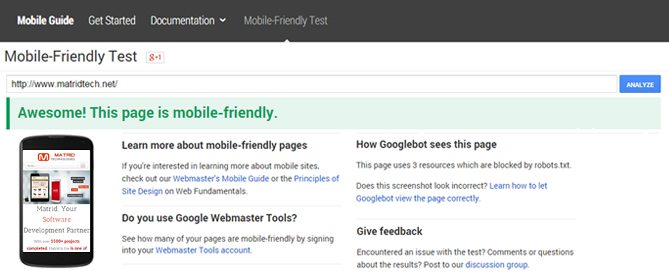The Latest Scoop on Google’s Mobile-Friendly Algorithm Update – 8 Things You Must Know to save yourself from the heat of this hype
On February 26th, Google dropped a major bomb stating it would be releasing a new mobile-friendly algorithm update. According to recent reports, the algorithm will be released on April 21, 2015 and is said to use mobile-friendliness as a stronger ranking signal than ever before. Additionally, it will also increase the relevance of having a mobile app.
The change, which will take about a week to complete, has scared many small businesses that the update is being referred to by names, such as mopocalypse, mobocalypse, mobilegeddon, and mobilepocalyse. Regardless, to give you a clearer picture of what is actually happening, here are answers to eight common questions we have been getting a lot regarding the update. This will hopefully solve all your confusions!
What Changes Is Google Making To Its Algorithm?
Lately, Google has been introducing several advanced development guidelines that impact mobile, such as the presentation of mobile SERPS and Google Play. In a nutshell, when Google said it would be using mobile-friendliness as a ranking signal, it is possible that the new algorithm would do a better job of crawling Deep links in iOS apps, Android apps, and single-page websites.
Therefore, it seems Google has surprisingly reduced its historical focus on avoiding mobile-only errors, increasing mobile page speed, minimizing redirects, and instead wants to focus on accurately evaluating its content and ranking results. Thankfully, unlike other algorithm updates, Google is actually telling you about this, before they roll it out.
How Much Will Mobile Search Results Rankings Be Impacted?
At the SMX Munich conference, Zineb from Google stated that the 4/21 change will be larger than its previous Penguin and Panda updates. Therefore, if we calculate the impact of those previous updates and how they affected desktop rankings, it could be possible that mobile rankings will be affected on a larger scale on both iOS devices and Android devices equally.
This means the new algorithm could possibly also validate Android and iOS apps through Google’s latest Deep Link Tool. Additionally, since mobile email opens have grown significantly in three years by almost 180%, it seems Google is taking advantage of this increased engagement of mobile devices by optimizing and indexing all emails that come into your Gmail account. Inclusions like this mean that even if you do manage to retain your keywords rankings after the 4/21 changes, chances are you may not necessarily be able to maintain your mobile traffic.
Will the Change Affect Desktop Search Rankings As Well?
At the same SMX Munich, Google’s employee Zineb responded to the question in the negative without any hesitation. This means the new algorithm is indeed related to a new crawler to bring about a major change in mobile infrastructure. Regardless of the changes, the new crawler will evaluate mobile search results but not desktop results. That being said, you should not be worried for your Desktop rankings but make sure you take the mobile-friendly test by Google and make the advised changes beforehand to ensure your mobile rankings are not affected.
What If Your Mobile-Site Doesn’t Meet Google’s Requirements?
In order to help businesses out, Google has introduced a Mobile-Friendly Test that will give you a ‘no’ or ‘yes’ answer on a per-URL basis. This means each page is evaluated individually, but if you are looking for a quicker way to get a sense on how your pages perform, consider a “site:” query for your domain on your phone. For instance, “site: yourdomain.com”.
If your site doesn’t meet Google’s requirements, utilize these handy tips and make the following changes. However, when updating a page and pushing it for live testing, make sure to see if the mobile-friendly tool has successfully noticed the update. But since time isn’t exactly your best friend right now, make sure to try this tool ASAP!
What About A Site That Redirects To A m. (mDot) Sub-Domain or in any other form of mobile friendliness?
Sites that redirect to a mobile sub-domain should be considered mobile-friendly. Now, why is that? Well, after Google rolled out its latest mobile-friendly tagging, a huge increase was noticed in mDot (m.) websites. Additionally, it was also noticed that these sites were ranking well in mobile SERPS. Therefore, with the 4/21 changes, it can automatically be assumed that redirected mobile sub-domains will be considered mobile-friendly.
How Does Having A Mobile App Affect Rankings?
Since, Google has now started treating apps as a new kind of universal search result. If a mobile search query is highly correlated with mobile app listings, it is possible your app could receive significantly more visibility within search results pages. That being said, an “App Pack” could possible improve mobile website rankings even more.
Google will be considering “high quality” apps as a positive factor in mobile search. Therefore, Google could possibly be using Deep Links between your apps and mobile website to improve overall rankings in mobile search results.
Do You Require an Android or iOS App? Has it gone a must now?
If you do decide to invest in an app, there will be significant value. Not to mention, you could possibly achieving higher rankings in the mobile search engine results. However, this doesn’t mean investing in an app is essential. If you are on a limited budget, your business might well be served with a mobile website that is better tailored to viewer needs and Google’s requirements.
But if you have the budget and feel your business well better be suited by a mobile app, then there is no harm in making that experience great across mobile devices. Nevertheless, this doesn’t mean you create an app just for the sake of better search results. The app you create should offer valuable utilities that prove to be beneficial for consumers.
What Is Google’s Goal for Introducing This New Algorithm?
As you can see from the information above, there are obviously a lot of goals in the mix here. Regardless, we do believe that Google is making these changes only to enhance and promote a better mobile experience for searchers. For instance, Google has constantly been encouraging publishers to include lyrics with songs and transcripts with videos, to provide a better experience for consumers and searchers.
Even though the 4/21 changes might seem a bit frightening at first, as long as you follow the steps and meet Google’s requirements, you will have nothing to worry about. Having said that the ongoing hype to get a responsive website is not what Google intend to create, it seems that any sort of mobile sites will work either it is a m. sub-domain or a mobile skin and more importantly, there does not seem to be any intention from Google that your Desktop rankings will be disturbed but still mobile traffic is at stake.
Please contact us with any questions you may have; we’re always here to help.







Leave A Comment